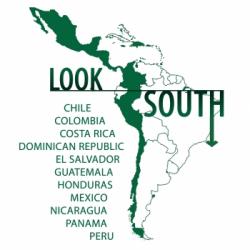|
Created on June 18, 2014 |
This post is part of the global blog series the Minority Business Development Agency (MBDA) started during World Trade Month.
George Mui is the Access to Markets team lead in MBDA’s Office of Business Development.
The U.S. Department of Commerce, through its Look South campaign, helps U.S. exporters to expand their markets and identify new opportunities in Latin America. U.S. goods exports to Peru, Panama, Mexico, and Colombia have increased every year since 2009. As we celebrate the second year anniversary of the U.S.-Colombia Free Trade Agreement more American companies are exporting goods and services to Colombia, the vast majority of which are duty-free. The U.S.-Colombia Free Trade Agreement is just one of the 11 free trade agreements between the United States and Latin American countries.
That’s why MBDA San Antonio Business Center director Orestes Hubbard and MBDA Global Business Center project manager David Leister visited Colombia along with an MBDA Global Business Center client, Carlos Silva, CEO of USATEQ, a Colombian native.
MBDA San Antonio director Orestes Hubbard shared his experience with George Mui, MBDA’s Access to Markets team lead in the Office of Business Development.
Mui: Why did you choose to travel to Colombia?
Hubbard: Colombia has a very advantageous geography and is roughly twice the size of the state of Texas – where I live. Colombia is also the only country in South America with access to both the Atlantic and Pacific Oceans and has long had good diplomatic and trade relations with the United States.
Mui: What was the purpose of your trip?
Hubbard: The purpose of the trip was to make contacts and identify concrete and tangible contracting opportunities for not only our center clients, but also opportunities for minority-owned businesses across the nation. We visited the two largest cities and major centers of commerce and industry, Bogota and Medellin.
Mui: You found some impressive opportunities – can you highlight a few of the industries?
Hubbard: In total, we discovered over $30 billion of business opportunities. There are private sector opportunities for U.S. construction and engineering companies looking for potential partners on infrastructure projects. The Colombian government has a number of opportunities in the renewable energy, highway, and railway industries. Colombia is the third ranked automobile manufacturer in Latin America, which creates significant opportunities for manufactured products, preferably automotive-related. For more information on opportunities in Colombia I recommend businesses visit the best prospect sectors for Look South countries.
Mui: An MBDA Global Business Center client was part of the trip to Colombia – what was the client’s impact?
Hubbard: Inviting a Colombian-American client from Medellin proved invaluable as Mr. Silva was able to make key government and private sector introductions, particularly in the areas of construction, renewable energies and automotive supply chain in Colombia.
Mui: What were your key takeaways?
Hubbard: Our trip confirmed what most trade reports declare, that Colombia is open for business and the stigma of the drug cartels and vast conflict with the Fuerzas Armadas Revolucionarias de Colombia (FARC) are things of the past. The main challenges appear to deal with traffic snafus and the need for the Colombian government to continue its admirable commitment toward growing the middle class.
However, it must be noted that fluency in Spanish is essential to having success in Colombia. This applies not only to the obvious case of setting up a local facility, but also when engaging a market representative. It is important that a good knowledge of Spanish is available in-house in the United States operations.
Mui: Can you discuss on-the-ground resources available to help minority-owned firms?
Hubbard: We cannot emphasize enough the invaluable role the U.S. Commercial Service in Colombia plays in assisting MBDA clients get into the Colombian market. We met with senior commercial officer Cameron Werker, foreign commercial officer Aaron Held, and a Colombian national market specialist, all of whom were very helpful in sharing information and resources pertaining to helping U.S. companies successfully enter the Colombian market.
This was an excellent collaborative meeting in which we gained critical insight into the Colombian economy and political workings. We mutually agreed that after registering with the local United States Export Assistance Center in the United States, all minority business enterprise clients interested in doing business in Colombia would be promptly referred to U.S. Commercial Service in Colombia to obtain market intelligence and critical introductions to events and contacts.
All in all, we came away impressed with the seeming transparency and relative ease of starting up a company, pulling in on-the-ground resources in Colombia from both the U.S. Embassy, as well as local Colombian trade and investment vehicles.
Mui: What advice do you have for U.S. companies thinking about exporting?
Hubbard: For minority-owned firms who want to learn about global business, and believe your product or service can be sold abroad, your first stop should be an MBDA Business Center. Contact Orestes Hubbard, director of the MBDA San Antonio Business Center at [email protected] or 210-458-2480.
 MBDA supports the Look South campaign with a successful business exploration trip to Colombia. As a result, more than $30 billion of global contract opportunities were identified in both private and public sectors. Additionally, the MBDA Global Business Center also identified key strategic partners, such as the American Chamber of Commerce and ProExport Colombia. We look forward to bringing you more insights from Colombia.
MBDA supports the Look South campaign with a successful business exploration trip to Colombia. As a result, more than $30 billion of global contract opportunities were identified in both private and public sectors. Additionally, the MBDA Global Business Center also identified key strategic partners, such as the American Chamber of Commerce and ProExport Colombia. We look forward to bringing you more insights from Colombia.
MBDA and ITA have pledged a memorandum of understanding through January, 2016 that provides assistance to minority companies to develop their export potential through increased awareness and use of existing ITA products and services; increase ITA and MBDA cooperation at the regional and district office/local level, especially in regard to export counseling and trade finance training for minority firms.
Posted at 8:16 AM
Export Expansion



